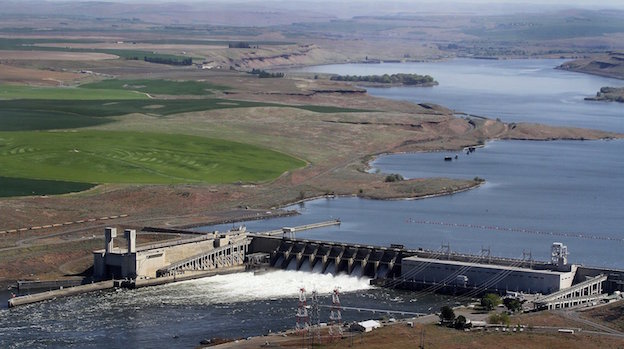forum
library
tutorial
contact

New Department of Energy Study to Weigh
Energy Challenges, Dam Breaching
by Matthew Weaver
Capital Press, September 24, 2024
|
the film forum library tutorial contact |

|
New Department of Energy Study to Weigh
by Matthew Weaver
|
"We kind of view it as somewhat innocuous activity,"
-- Darryll Olsen, Columbia-Snake River Irrigators Association
 A new federal study called the Pacific Northwest Regional Energy Planning Project will consider ways to replace the services of the lower Snake River dams as it weighs the region's overall energy challenges.
A new federal study called the Pacific Northwest Regional Energy Planning Project will consider ways to replace the services of the lower Snake River dams as it weighs the region's overall energy challenges.
"The Northwest is facing a combination of energy system challenges, including resource adequacy, historic load growth forecasts, climate impacts to a hydropower-dominated system, natural resource and ecosystem concerns, and decarbonization," the U.S. Department of Energy stated in announcing the study. "However, most current planning for generation, transmission and distribution infrastructure takes place at the individual utility level. More granular and coordinated analysis and planning could make it easier for the many entities involved in owning, operating and investing in the regional grid to understand and address these challenges."
The department has not responded to Capital Press requests for comment.
The study will combine "best-in-class datasets and projections" on weather trends, extreme weather events, and new electricity demands to produce a set of future scenarios that can meet growing regional demand, provide reliable electric service, and align with regional energy policies, according to the department.
The study will provide potential infrastructure solutions to address the needs and challenges identified without prescribing any specific actions, according to the department.
"It will examine at least one scenario looking at what infrastructure and resources could be needed to replace the power and services provided by the four Lower Snake River Dams should Congress authorize removal," the department stated, citing its commitments under the memorandum of understanding signed in December between the federal government, four treaty Tribes of the lower Snake River and the states of Oregon and Washington.
"This is yet another step down the dangerous path towards dam breaching, which would jeopardize reliable electricity for millions of Americans in the Pacific Northwest," said Jim Matheson, CEO of the National Rural Electric Cooperative Association, in a press release. "Not only does this expose a severe lack of understanding about the importance of keeping the lights on, it also reveals a misplaced desire to undermine our nation's essential portfolio of carbon-free hydroelectric resources without considering the cost."
The lower Snake River Dams produce enough electricity to power 2.4 million homes, Matheson said.
Darryll Olsen, board representative for the Columbia-Snake River Irrigators Association (CSRIA), noted the study is no surprise, as it's part of the litigation settlement agreement.
"We kind of view it as somewhat innocuous activity," Olsen said.
PREPP is now under the umbrella of the Columbia River Task Force formed in June, he noted.
CSRIA has suggested deep drawdowns at Lower Granite and Little Goose dams as an alternative. Leadership at the task force and the White House Council on Environmental Quality are aware of that option, Olsen said.
"I would anticipate they are going to look at something other than just four-dam breach, but we won't know until they start to move forward with their sub-groups and technical work," he said.
Senator Jim Risch Statement on
Northwest Energy Planning Project
September 20, 2024BOISE, Idaho -- U.S. Senator Jim Risch (R-Idaho) released the following statement upon the launch of the Department of Energy's Pacific Northwest Regional Energy Planning Project.
"The last thing Idahoans need is the Biden-Harris administration forcing its extreme mandates on our energy planning, transmission, and infrastructure decisions. This is another thinly veiled attempt to push for breaching the lower Snake River dams. We need more reliable, baseload power, not less. Fortunately, this administration has absolutely no authority to remove these dams. That power rests with Congress alone. These dams aren't going anywhere."
Risch has been a staunch defender of the lower Snake River dams and introduced the Northwest Energy Security Act to protect the operation of the Federal Columbia River Power System.
In 2022, the White House Council on Environmental Quality (CEQ) released a draft report from the National Oceanic and Atmospheric Administration (NOAA) advocating for breaching at least one of the Lower Snake River dams to improve salmon populations. It also published a study commissioned by the Bonneville Power Administration (BPA) laying out scenarios to replace power generated by the dams.
Following four years of comprehensive scientific study of the Columbia River System Operations, the U.S. Army Corps of Engineers, Bureau of Reclamation and Bonneville Power Administration released a record of decision in September 2020 affirming the four dams' critical importance to the region.
learn more on topics covered in the film
see the video
read the script
learn the songs
discussion forum
